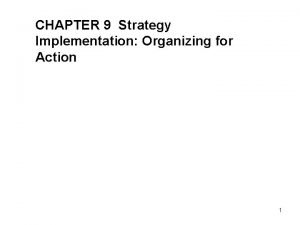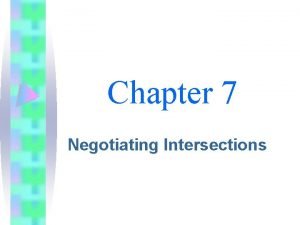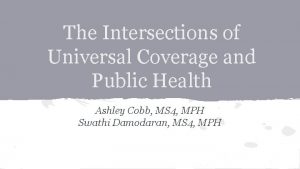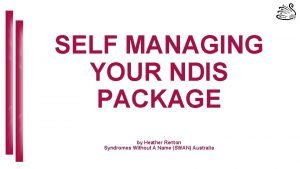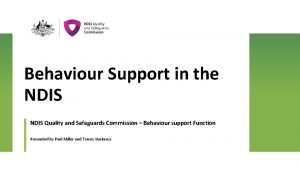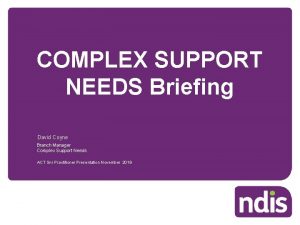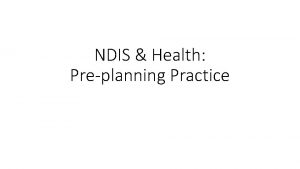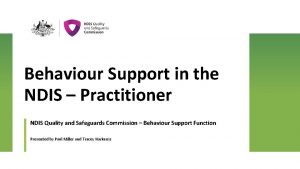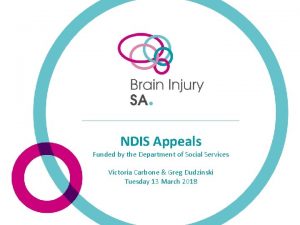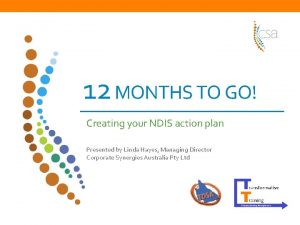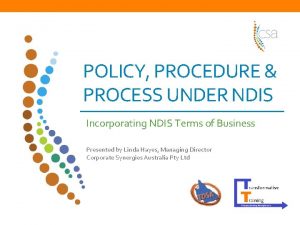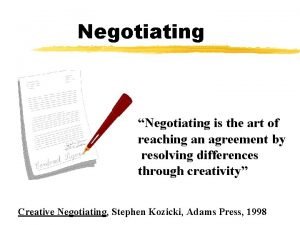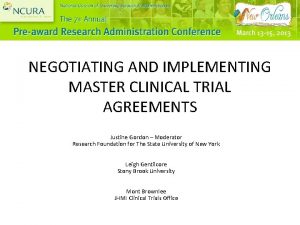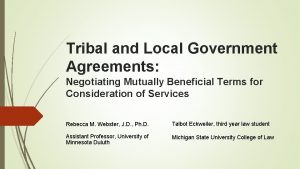NDIS Negotiating Service Agreements With Clients The Federal
























- Slides: 24

NDIS: Negotiating Service Agreements With Clients The Federal Government’s NDIS trial and launch sites around Australia are highlighting significant issues and challenges for service providers. One issue is the critical need for the service agreement with each participant to specify clearly at least what, how and when services will be performed. For service providers, a key element in being successful and sustainable in attracting and implementing participants’ NDIS funded support plans is to identify and clearly specify the nature and extent of what is (and what is not) included in the services that clients’ purchase for the NDIA fixed-price. It is essential that service providers develop a sound understanding of the role, risks and process in negotiating a legal service agreement with each participant under NDIS. The drafting of fair terms and conditions of delivering support services under the participant’s service agreement with the service provider is emphasised. Bringing People Together To develop responses to the community’s needs for transport, access and mobility 1

NDIS: Negotiating Service Agreements With Clients WORKSHOP OBJECTIVES q Essential elements of contract law; q Using the NDIA model service agreement – strengths and limitations q Drafting your organisation’s necessary and specific terms and conditions; q Tips and traps in using standard templates and clauses; q Negotiating the service agreement; and q How parties’ rights and obligations under service agreements are managed and enforced. Bringing People Together To develop responses to the community’s needs for transport, access and mobility 2

NDIS: Negotiating Service Agreements With Clients Overview of NDIS legislative framework impacting on service agreements q National Disability Insurance Scheme Act 2013 q National Disability Insurance Scheme Rules (pursuant to sec. 17 of Act) << NDIS (Registered Providers of Supports) Rule 2013 q NDIA’s CEO “Operational Guidelines” (pursuant to a Rule under the Act) << Operational Guideline – Registered Providers of Supports and NDIS Terms of Business for Registered Support Providers Bringing People Together To develop responses to the community’s needs for transport, access and mobility 3

NDIS: Negotiating Service Agreements With Clients Overview of NDIS legislative framework impacting on service agreements NDIS RULES include: q Becoming a Participant q Children q Facilitating the Preparation of Participants’ Plans – Queensland (2016) q Nominees q Registered Providers of Supports q Supports for Participants q Plan Management q Protection and Disclosure of Information q Supports for Participants – Accounting for Compensation q Timeframe for Decision Making q Risk Management Bringing People Together To develop responses to the community’s needs for transport, access and mobility 4

NDIS: Negotiating Service Agreements With Clients Overview of NDIS legislative framework impacting on service agreements NDIS Act 2013 (Cwth) – sec. 3 – Objects of the Act: (extracts only) q Provide reasonable and necessary supports for participants in the NDIS launch (s. 3(1)(d)) q Enable people with disability to exercise choice and control in the pursuit of their goals and the planning and delivery of their supports (s. 3(1)(e)) q Adopting an insurance-based approach, informed by actuarial analysis, in the provision and funding of supports for people with disability (s. 3(2)(b)) q In giving effect to the objects of the Act, regard is to be had to … the need to ensure the financial sustainability of the NDIS (s. 3(3)(b)) Bringing People Together To develop responses to the community’s needs for transport, access and mobility 5

NDIS: Negotiating Service Agreements With Clients Overview of NDIS legislative framework impacting on service agreements Specifically, participants’ legal rights of choice and control q Participant has right to determine their own best interests (s. 4) q Participant has right to engage as equal partners in decisions that will affect their lives to the full extent of their capacity (s. 4) q Participant chooses service provider(s) for contracted services [rights and obligations under contract law] q Participant has right to pursue any grievance (s. 4) Bringing People Together To develop responses to the community’s needs for transport, access and mobility 6

NDIS: Negotiating Service Agreements With Clients Overview of NDIS legislative framework impacting on service agreements Funding reasonable and necessary supports q Participant’s Plan must include any general or reasonable and necessary supports that will be provided or funded as part of the plan. q Supports must provide value for money (s. 34 ). q NDIA delegates are to explain to the participant and where relevant their family and carer, the consideration that has gone into a plan. q Delegate documents statement of reasons for the decision (the letter that accompanies the provision of the plan) and provide a copy of the plan to the participant within 7 days. Bringing People Together To develop responses to the community’s needs for transport, access and mobility 7

NDIS: Negotiating Service Agreements With Clients Overview of NDIS legislative framework impacting on service agreements Example: NDIS funded reasonable and necessary supports in participant’s plan. [Training purposes only] Bringing People Together To develop responses to the community’s needs for transport, access and mobility 8

NDIS: Negotiating Service Agreements With Clients Overview of NDIS legislative framework impacting on service agreements Whether participants were existing clients of state or commonwealth funded program (blue+purple) or are “new” to government funding of supports (brown & green) NDIA “Participant Dashboard – Hunter Trial Site – December 2015” Bringing People Together To develop responses to the community’s needs for transport, access and mobility 9

NDIS: Negotiating Service Agreements With Clients Overview of NDIS legislative framework impacting on service agreements NDIS: NSW average package funding (NDIS report to COAG 2014 -2015) Bringing People Together To develop responses to the community’s needs for transport, access and mobility 10

NDIS: Negotiating Service Agreements With Clients Overview of NDIS legislative framework impacting on service agreements Who manages participants’ funded support plans? “There are four ways you (participants) can manage the funding for your supports: 1. Self-managed 2. Registered plan management provider 3. NDIA managed 4. A combination of the above. “ (NDIA Factsheet “Managing your supports and NDIS funding” p. 1) Bringing People Together To develop responses to the community’s needs for transport, access and mobility 11

NDIS: Negotiating Service Agreements With Clients Overview of NDIS legislative framework impacting on service agreements NDIA Managed Plan Bringing People Together To develop responses to the community’s needs for transport, access and mobility 12

NDIS: Negotiating Service Agreements With Clients Overview of NDIS legislative framework impacting on service agreements NDIA Participant Self-Managed Plan Bringing People Together To develop responses to the community’s needs for transport, access and mobility 13

NDIS: Negotiating Service Agreements With Clients Overview of NDIS legislative framework impacting on service agreements Registered Plan Manager - Managed Plan Bringing People Together To develop responses to the community’s needs for transport, access and mobility 14

NDIS: Negotiating Service Agreements With Clients Overview of NDIS legislative framework impacting on service agreements Requirements for a Service Agreement: HANDOUT Service agreements: It is expected that providers will work with a participant to establish written or verbal agreement about the nature, quality and price of supports to be provided. All supports delivered will be in accordance with that agreement. Such agreements will accord with the National Disability Insurance Scheme Model Agreement and incorporate input from participants including internal management of complaints and cessation of supports. Service agreements need to be consistent with the National Disability Insurance Scheme’s pricing arrangements and guidelines. (Terms of Business p. 1) Bringing People Together To develop responses to the community’s needs for transport, access and mobility 15

NDIS: Negotiating Service Agreements With Clients Overview of NDIS legislative framework impacting on service agreements ARE WRITTEN SERVICE AGREEMENTS ESSENTIAL? “An oral agreement is a binding contract unless the law requires a written contract. Contracts relating to the purchase of land, credit and insurance, and contracts of guarantee and door-to-door sales are a few examples of where written contracts are required before the agreements are binding. ” – Queensland Law Handbook “You will normally need to make a written agreement with your provider(s) that sets out what supports will be provided and how they will be delivered. ” NDIA Guide “Making A Service Agreement With Your Provider(s)” “A participant who chooses to engage someone to provide supports under an NDIS plan will generally enter into a written agreement with the provider (a Service Agreement). ” NDIA Guide “Making A Service Agreement With A Participant” As a general rule, parties are bound by all terms contained in a document that they sign, regardless of whether they have read them or understood them. Bringing People Together To develop responses to the community’s needs for transport, access and mobility 16

NDIS: Negotiating Service Agreements With Clients Overview of NDIS legislative framework impacting on service agreements Why written service agreement is best practice Gives a context to interpreting the contractual relationship Protects legal rights/obligations of all parties - fairness Documents exactly what services are being provided Explicitly records agreement on key conditions such as : Timeframes Payment for satisfactory delivery of services Required level of service quality Procedure for resolving disputes Protects confidential information Process vary the agreement When and how the agreement can be terminated Any special terms or conditions Other reasons why important? Bringing People Together To develop responses to the community’s needs for transport, access and mobility 17

NDIS: Negotiating Service Agreements With Clients Essential elements of contract law Service Agreements (contracts) contain promises between 2 or more parties with intention of creating legal rights and obligations that are legally enforceable. Essential elements in contract law 1. Intention to create legal relationships Intention that promises will create legally enforceable obligations 2. 3. 4. 5. Legal capacity to contract Genuine consent Offer and Acceptance Consideration Something of value passing from one party to the other in return for a promise to do something 6. Legality of purpose Bringing People Together To develop responses to the community’s needs for transport, access and mobility 18

NDIS: Negotiating Service Agreements With Clients NDIA model service agreement – strengths and limitations HANDOUT Strengths include: q NDIA recognises as minimum/core requirement q Easy to read and understand q Supported by guide materials Limitations include: q May not cover all parties’ needs and risks q Not specific enough – (“devil is in the detail”) Others? ? Bringing People Together To develop responses to the community’s needs for transport, access and mobility 19

NDIS: Negotiating Service Agreements With Clients Tips and traps in using standard templates and clauses Handout: example clauses • Document Title • Date agreement is made (executed) and term (start/end) • Parties (legal names; addresses; short title – Participant and Provider) • Preamble/recitals/background • Terms and Conditions q Offer and acceptance q Consideration q Termination for cause q Responsibilities/duties each party q Indemnities and Liabilities q Non-assignment q Payment for services (invoicing; direct debit; deposits [deposits, bonds etc. not permitted for NDIS funded supports] ) q GST Bringing People Together To develop responses to the community’s needs for transport, access and mobility CONTINUED NEXT SLIDE >>> 20

NDIS: Negotiating Service Agreements With Clients Drafting your organisation’s necessary and specific terms and conditions q Amendments to the agreement q Dispute resolution q Remedies q Obligations that survive termination q Authorised contacts q Notices and communications q Entire agreement q Exercise of own judgement on advice q Force Majeure q Execute additional documents and perform acts q Applicable law q Definitions/Interpretation* q Execution/signature clauses (Authority of person signing? ) q Schedules and Appendices Bringing People Together To develop responses to the community’s needs for transport, access and mobility Other clauses? 21

NDIS: Negotiating Service Agreements With Clients Negotiating the service agreement q Know exactly limits of your organisation’s capabilities, services (features and benefits), resources (capacities) q Know and respect the legal rights of participants under the NDIS Act q Understand any outside forces that may affect the negotiation q Agree nature, scope, process, note-taking and negotiation timeframes q Plan for alternative outcomes if you can't reach agreement this session q List/prioritise the needs/wants/issues which are important to both parties – look for early points of agreement before tackling points of uncertainty or difficulty q Listen carefully to the participant - assess practicality and implications of their needs, wants, instructions, requests and arguments q Check for mutual understanding – use examples - clarify issues not clear about – use open questions: what, why, how, when, where and who q Keep calm - use tact and diplomacy – summarise points of agreement achieved so far to diffuse tensions or overcome any blockages q Use verbal and non-verbal communication/persuasion skills - open, encouraging signals (“I understand what you are saying”) – positive body language; not defensive or closed. q Know if/when able to compromise - distinguish between needs and wants q Use common-sense judgement i- come to an agreement and explain next steps. Bringing People Together To develop responses to the community’s needs for transport, access and mobility 22

NDIS: Negotiating Service Agreements With Clients How parties’ rights and obligations under service agreements are managed and enforced q Ensure the Service Agreement is clear, concise and written/signed – and known/understood/used by all parties/staff – amend if circumstances change q Contemporaneous notes of meetings - contract performance feedback, complaints addressed and remedial actions documented q Give/receive early warning of potential/escalating disputes – get facts, consider options, make decisions, document considerations/actions q Formal written warning notices of potential/actual breach of contract – facts, causal factors, remedies required to resolve, consequences if not resolved, set timeframe for action to address; provide natural justice to respond q If appropriate seek legal advice – (complex, severe consequences, set precedent ) q Try to avoid legal enforcement in Tribunals or Courts – expensive Bringing People Together To develop responses to the community’s needs for transport, access and mobility 23

NDIS: Negotiating Service Agreements With Clients Final questions? Additional resources: TDSA previously supplied a CD containing additional resources (including copies of the Workbook, Handouts and Presentation Slides). Instead of CDs, the TDSA website now enables a download of all these additional resources for all TDSA Think Tank modules you attend. You will need the password to access each module – and will be provided to you (or you can obtain it directly by emailing or phoning TDSA) We thank you for your participation in today’s Think Tank ! Could you please complete the Feedback/Evaluation Form and leave it face down on the desks. Thank you Bringing People Together To develop responses to the community’s needs for transport, access and mobility 24
 Ltsa long term service agreement
Ltsa long term service agreement Pooled negotiating power
Pooled negotiating power Sap renewal negotiation
Sap renewal negotiation Pooled negotiating power
Pooled negotiating power Controlled railroad crossings usually have
Controlled railroad crossings usually have An uncontrolled railroad crossing usually has
An uncontrolled railroad crossing usually has Saunders lewis & thornhill 2009
Saunders lewis & thornhill 2009 At an open or uncontrolled intersection, yield if _____.
At an open or uncontrolled intersection, yield if _____. Chapter 7 negotiating intersections
Chapter 7 negotiating intersections Chapter 10 negotiating intersections
Chapter 10 negotiating intersections Weiss’ strategic framework for negotiating
Weiss’ strategic framework for negotiating Windows kernel internals
Windows kernel internals Heather purdin
Heather purdin Ndis behaviour support competency framework
Ndis behaviour support competency framework David coyne ndis
David coyne ndis Feros care ndis
Feros care ndis Ndis 6
Ndis 6 Samantha taylor ndis commission
Samantha taylor ndis commission School leaver employment support 1
School leaver employment support 1 Ndis sil quoting tool
Ndis sil quoting tool Ndis behaviour support competency framework
Ndis behaviour support competency framework Ndis s48
Ndis s48 Ndis 6
Ndis 6 Ndis readiness checklist
Ndis readiness checklist Ndia solic
Ndia solic

